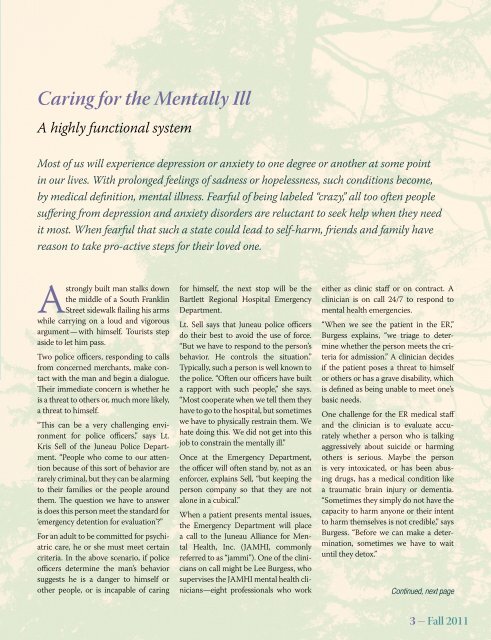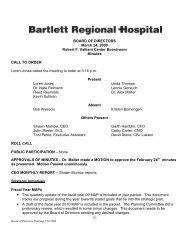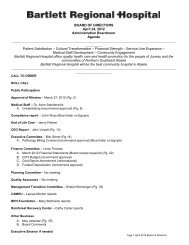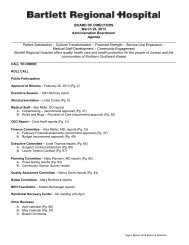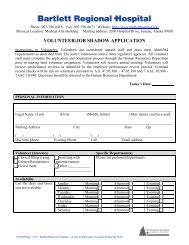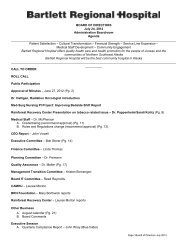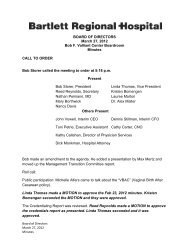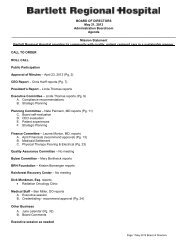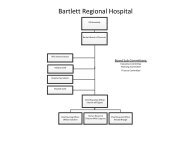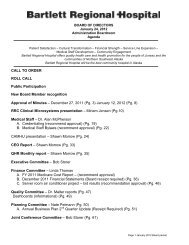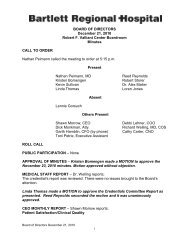Newsletter - Bartlett Regional Hospital
Newsletter - Bartlett Regional Hospital
Newsletter - Bartlett Regional Hospital
Create successful ePaper yourself
Turn your PDF publications into a flip-book with our unique Google optimized e-Paper software.
Caring for the Mentally Ill<br />
A highly functional system<br />
Most of us will experience depression or anxiety to one degree or another at some point<br />
in our lives. With prolonged feelings of sadness or hopelessness, such conditions become,<br />
by medical definition, mental illness. Fearful of being labeled “crazy,” all too often people<br />
suffering from depression and anxiety disorders are reluctant to seek help when they need<br />
it most. When fearful that such a state could lead to self-harm, friends and family have<br />
reason to take pro-active steps for their loved one.<br />
A<br />
strongly built man stalks down<br />
the middle of a South Franklin<br />
Street sidewalk flailing his arms<br />
while carrying on a loud and vigorous<br />
argument—with himself. Tourists step<br />
aside to let him pass.<br />
Two police officers, responding to calls<br />
from concerned merchants, make contact<br />
with the man and begin a dialogue.<br />
Their immediate concern is whether he<br />
is a threat to others or, much more likely,<br />
a threat to himself.<br />
“This can be a very challenging environment<br />
for police officers,” says Lt.<br />
Kris Sell of the Juneau Police Department.<br />
“People who come to our attention<br />
because of this sort of behavior are<br />
rarely criminal, but they can be alarming<br />
to their families or the people around<br />
them. The question we have to answer<br />
is does this person meet the standard for<br />
‘emergency detention for evaluation’?”<br />
For an adult to be committed for psychiatric<br />
care, he or she must meet certain<br />
criteria. In the above scenario, if police<br />
officers determine the man’s behavior<br />
suggests he is a danger to himself or<br />
other people, or is incapable of caring<br />
for himself, the next stop will be the<br />
<strong>Bartlett</strong> <strong>Regional</strong> <strong>Hospital</strong> Emergency<br />
Department.<br />
Lt. Sell says that Juneau police officers<br />
do their best to avoid the use of force.<br />
“But we have to respond to the person’s<br />
behavior. He controls the situation.”<br />
Typically, such a person is well known to<br />
the police. “Often our officers have built<br />
a rapport with such people,” she says.<br />
“Most cooperate when we tell them they<br />
have to go to the hospital, but sometimes<br />
we have to physically restrain them. We<br />
hate doing this. We did not get into this<br />
job to constrain the mentally ill.”<br />
Once at the Emergency Department,<br />
the officer will often stand by, not as an<br />
enforcer, explains Sell, “but keeping the<br />
person company so that they are not<br />
alone in a cubical.”<br />
When a patient presents mental issues,<br />
the Emergency Department will place<br />
a call to the Juneau Alliance for Mental<br />
Health, Inc. (JAMHI, commonly<br />
referred to as “jammi”). One of the clinicians<br />
on call might be Lee Burgess, who<br />
supervises the JAMHI mental health clinicians—eight<br />
professionals who work<br />
either as clinic staff or on contract. A<br />
clinician is on call 24/7 to respond to<br />
mental health emergencies.<br />
“When we see the patient in the ER,”<br />
Burgess explains, “we triage to determine<br />
whether the person meets the criteria<br />
for admission.” A clinician decides<br />
if the patient poses a threat to himself<br />
or others or has a grave disability, which<br />
is defined as being unable to meet one’s<br />
basic needs.<br />
One challenge for the ER medical staff<br />
and the clinician is to evaluate accurately<br />
whether a person who is talking<br />
aggressively about suicide or harming<br />
others is serious. Maybe the person<br />
is very intoxicated, or has been abusing<br />
drugs, has a medical condition like<br />
a traumatic brain injury or dementia.<br />
“Sometimes they simply do not have the<br />
capacity to harm anyone or their intent<br />
to harm themselves is not credible,” says<br />
Burgess. “Before we can make a determination,<br />
sometimes we have to wait<br />
until they detox.”<br />
Continued, next page<br />
3 — Fall 2011


